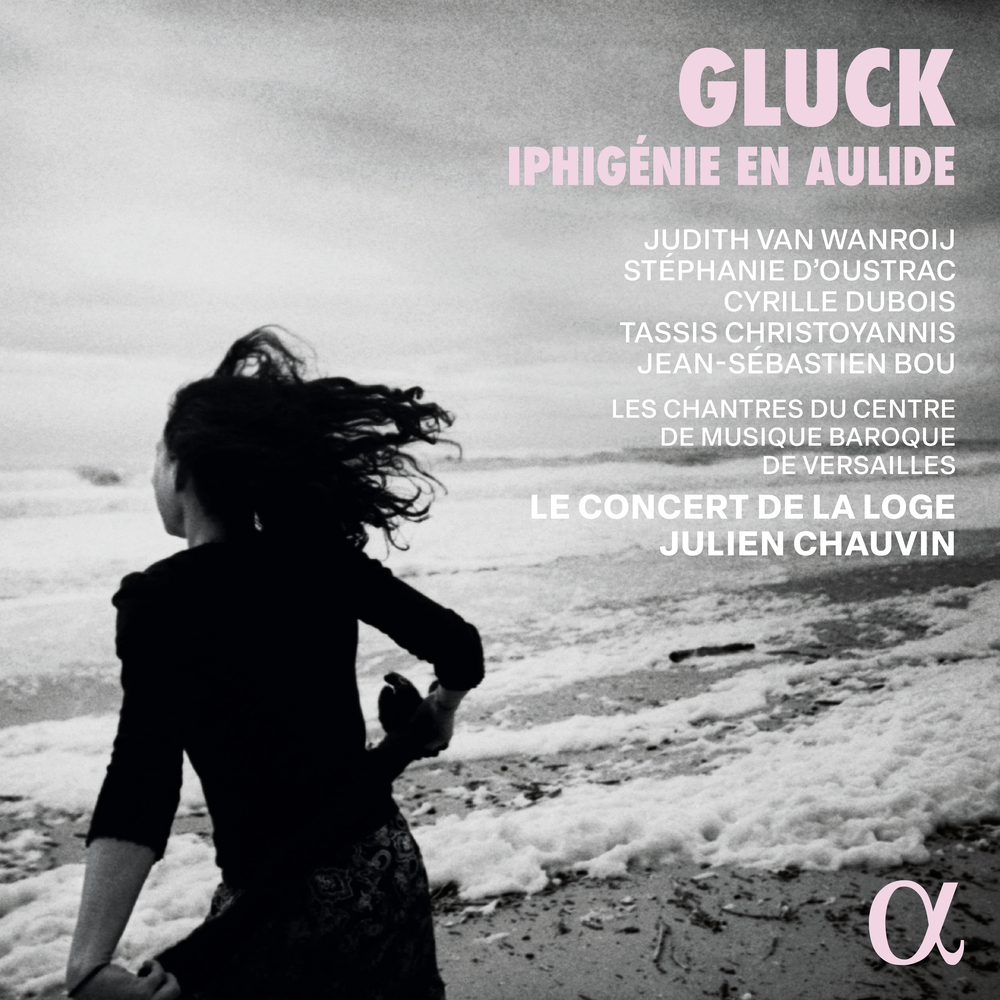GLUCK Iphigénie en Aulide (Chauvin)
View record and artist detailsRecord and Artist Details
Genre:
Opera
Label: Alpha
Magazine Review Date: 12/2024
Media Format: CD or Download
Media Runtime: 116
Mastering:
DDD
Catalogue Number: ALPHA1073

Tracks:
| Composition | Artist Credit |
|---|---|
| Iphigénie en Aulide |
Christoph Gluck, Composer
(Les) Chantres du Centre de Musique Baroque de Versailles Anne-Sophie Petit, Greek woman, Soprano Cyrille Dubois, Achille, Tenor David Witczak, Patrocle; Arcas, Baritone Jean-Sébastien Bou, Calchas, Baritone Jehanne Amzal, Greek woman, Soprano Judith Van Wanroij, Iphigénie, Soprano Julien Chauvin, Conductor Le Concert de la Loge Marine Lafdal-Franc, Greek woman, Soprano Stéphanie d' Oustrac, Clytemnestre, Mezzo soprano Tassis Christoyannis, Agamemnon, Baritone |
Author: Richard Wigmore
The opening salvo in Gluck’s conquest of Paris, Iphigénie en Aulide scored a triumph on its premiere in April 1774 and remained a repertoire staple well into the next century. Wagner, an ardent Gluck champion, created a German-language version for performance in Dresden. Today, though, Iphigénie en Aulide, to a libretto drawing on the tragedies of Racine and Euripides, is a serious rarity in the opera house. I can’t recall a professional production in Britain since Glyndebourne staged it in 2002. Little happens in the first act, despite many musical beauties. But from the moment in Act 2 when Iphigénie learns that she is to be sacrificed to appease the goddess Diana, the action moves forwards swiftly and inexorably, in a fluid intermingling of recitative, air and chorus. True to Gluck’s credo of dramatic truth and ‘beautiful simplicity’, not a note is wasted.
On disc John Eliot Gardiner’s Lyon Opéra performance has long virtually had the field to itself. Incorporating the ballet music Gluck added for a 1775 revival, Gardiner fields a fine cast and paces the drama convincingly, though as Stanley Sadie noted in his original review, his use of smoother-sounding modern strings and wind slightly compromises the starkness of Gluck’s sound world. Although tempos are often similar, this new performance, based on Gluck’s tauter 1774 original, offers a rawer, more engulfing experience. From the keening oboe and seething strings of the Overture, the period instruments of Le Concert de la Loge under Julien Chauvin are thrilling participants in a life-and-death drama. And the largely Francophone cast, seasoned in Baroque and Classical tragédie lyrique and, crucially, in the art of French declamation, could hardly be bettered.
In the title-role, Judith van Wanroij catches all of Iphigénie’s sweetness, vulnerability and, as the drama proceeds, inner strength. She unleashes the flame within her lyric soprano when Iphigénie imagines herself betrayed by her lover Achille, and brings an aching tenderness to her farewell airs to Clytemnestre and Achille. With a darker, richer tone than Gardiner’s impressive Anne Sofie von Otter, Stéphanie d’Oustrac is both formidable and deeply sympathetic as Clytemnestre, rising magnificently to the challenge of her anguished scene in Act 3. At its climax she denounces the gods’ cruelty (‘Dieux puissants’) with almost unhinged abandon, ferociously seconded by the orchestra.
The men are equally good. As Achille – a role written for the famous haute-contre Joseph Legros – Cyrille Dubois deploys his high tenor with grace and, where apt, commanding power. Achille’s aria of heroic defiance in Act 3, powered by rasping natural horns and trumpets, is a tour de force. Tassis Christoyannis yields to Gardiner’s José van Dam in nobility of tone but surpasses him in his no-holds-barred identification with Agamemnon’s appalling plight. His agonised scene at the end of Act 2 – a highlight of Gluck’s score – is almost unbearably moving.
The smaller roles, led by Jean-Sébastien Bou’s imposing High Priest, are all well taken. And the chorus can be both lyrically beguiling, as in the charming numbers at the opening of Act 2, and brutally incisive, above all in the laconic choruses of bloodthirsty Greeks that thread through the final act. I’d still want Gardiner for those additional 1775 numbers, especially the grand Passacaille at the end of Act 3, and memorable individual performances. But for their mingled musical insight and unflinching dramatic intensity, Chauvin and his superb forces now become the prime recommendation for what is arguably the most unjustly neglected opera of the 18th century.
Discover the world's largest classical music catalogue with Presto Music.

Gramophone Digital Club
- Digital Edition
- Digital Archive
- Reviews Database
- Full website access
From £8.75 / month
Subscribe
Gramophone Full Club
- Print Edition
- Digital Edition
- Digital Archive
- Reviews Database
- Full website access
From £11.00 / month
Subscribe
If you are a library, university or other organisation that would be interested in an institutional subscription to Gramophone please click here for further information.




